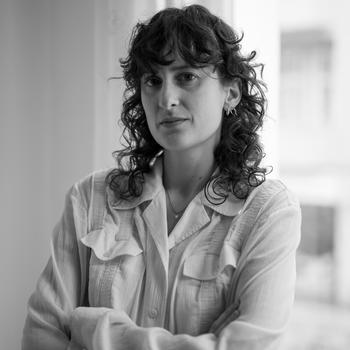Marta Lietti
Marta Lietti holds a bachelor's degree in Classics and Italian Literature from the State University of Milan with a final work in Historical Linguistic focused on the etymology of the Greek hero Bellerophon (BA 2016). At the same university, she completed a master in Philology, Literatures, and History of Antiquity with a thesis in Anthropology of the Classical World on the aesthetic and religious implications of wandering in Homer and Greek tragedy (MA 2019). She later earned a further master degree in Religious Studies at the Free University of Berlin, completing it with a thesis on ritual movements and gender identity in fifth-century Athens (MA 2021). During her master in Berlin, Marta has been working as student assistant within the DFG-funded Research Unit “Philology of Adventure” (FOR 2568) at the Chair of Religious Studies (Prof. Susanne Gödde). In June 2021, she was awarded with a nine-month PhD project grant at the Friedrich Schlegel Graduate School, Berlin.
Since October 2021 Marta is a doctoral research fellow at the Institute of Religious Studies of the Free University Berlin and member of the DFG-funded research training group 2638 “Normativity, Critique, Change”. Her PhD project is supervised by Prof. Susanne Gödde (FU, first supervisor), Prof. Giulia Sissa (UCLA, external second supervisor) and Prof. Doris Kolesch (FU, internal second supervisor).
Antigone’s Movements: Towards an Anthropological Dramaturgy of Sophocles’ Antigone and Oedipus at Colonus
My research project engages with three scenic, extra-scenic, and metaphorical movements involving the tragic figure of Antigone as written and staged by the Greek dramatist Sophocles in Antigone and Oedipus at Colonus.
The first movement is Antigone’s “being led” forcedly on and off stage, i.e., in and out of the walls of Thebes. The second movement concerns her metaphorical representation as a shrieking bird before the unburied body of her brother Polyneices and its relation to the flight of the Theban birds. The third is her wandering from Thebes to Colonus at the side of her father Oedipus. By scrutinizing these movements in their textual quality, I aim at disentangling their role in the unfolding of the tragic plot and the definition of the dramatis personae, on a dramaturgical level, and their relation to existing ritual and ritualised movements from the religious, legal and political discourse of the fifth century Athens, on an anthropological level. Wedding and funerary rites, legal procedures of the death sentence, divinatory practices, and initiatory experiences are among the phenomena which the moving body of Antigone mimics and alters. This project want to investigate how the power relations, gender normativity, and interaction between human, animal, and divine agents inscribed in them are questioned and rethought within the Athenian drama.
How do the scenic and metaphorical movements and gestures of the tragic body of Antigone correspond to or break with implicit and explicit norms of behaviour? Does the tragic imitation, perversion, interruption and inversion of normative ways of moving entail a critique of the society that shapes them? Does this intricate play of closeness and distance invite to reflect on the divine and human foundation underlying the norms involved? Does the tragic confrontation with the regulation of social life open up a horizon for change?
ARTICLES
Un/Remarkable movements in Sophocles’ Antigone, in Giulia Sissa (ed.), The Routledge Handbook of Classics and Anthropological Theory, Routledge, New York (Manuscript in preparation)
«Un tempo un’orsa selvaggia vagava». Corsa e genere nel rito attico dell’arkteia, in Giorgio Ferri (ed.): Ritual Movement in Antiquity (and Beyond), ed. Morcelliana, Brescia 2022, 178-191.
TALKS
16.06.2024: "Sofocle, Antigone 1261-1353", in Dialogo con Stefano Raimondi. Titubanti Test 9. Binomio di lettura, online
17.05.2024: "The Wandering Body of Antigone". Tragedy I TraumaUU Bodies I Boundaries, Humboldt Universität zu Berlin, 16.-17.05.2024
22.01.2024: “The drama of ἄγω in Sophocles‘ Antigone”. Forschungskolloquium Gräzistik, Humboldt Universität zu Berlin.
29.06.2023: “Antigone the shrieking Bird: Rage, Grief, and a failed Divination”. The Feminine Turn: A two-days Research Seminar on Sophocles’ Antigone, Freie Universität Berlin, 29-30.06.2023
21.03.2023: “Riflessioni sul movimento corporeo tra rituale, genere e potere nell’Antigone di Sofocle”, Classicamente, Conferenza Internazionale “And either I’m nobody, or I’m a nation. Identità in movimento nel mondo antico”. Dialoghi Senesi sul mondo Antico, Università di Siena, 20-21.03.2023
15.06.2019: „Die Vorbildlichkeit asketischen Lebens – Franziskus von Assisi in der Dichtung von Dante Alighieri und Alda Merini“, LNW Freie Universität Berlin.
ORGANISED WORKSHOPS AND CONFERENCES
(with Ina Karkani) 07.07.2023: Posthuman Normativities: Encounters with Otherness in Myth and Cinema. Ein interdisziplinärer Workshop mit Nele Wohlatz und Giulia Maria Chesi, Graduiertenkolleg 2638 “Normativität, Kritik, Wandel, Berlin”
(with Giulia Maria Chesi) 29-30.06.2023: The Feminine Turn: A two-days Research Seminar on Sophocles’ Antigone, Freie Universität Berlin
(with a committee of the GRK) 11.-12.05.2023: „Moving Normativity: Agency between Contestation and Confirmation. International Conference”, Uferstudios Berlin





